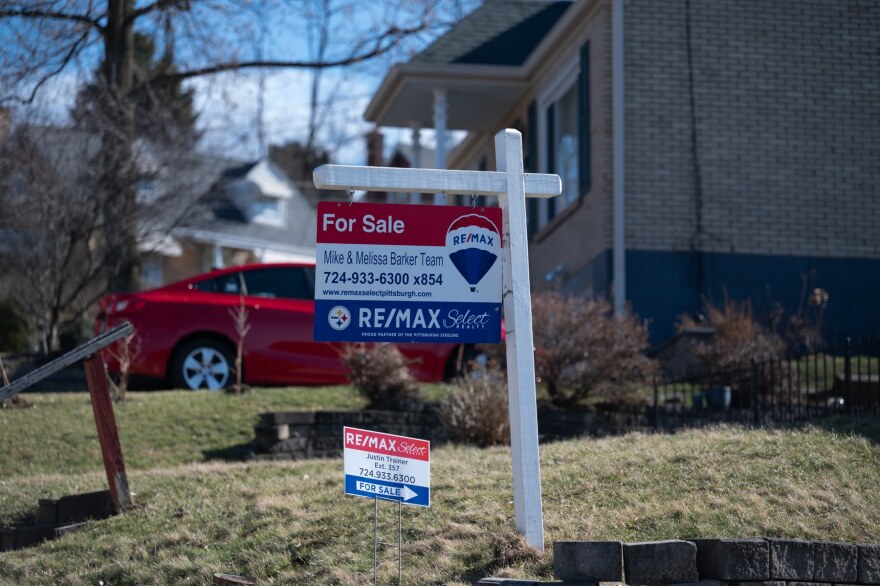When Aaron DeLeo bought his house in Verona in October 2020, he thought he’d lucked into a great deal.
DeLeo had been looking for months and hadn’t found anything suitable. But the owner of the house in Verona was in a hurry and accepted DeLeo’s offer at the asking price, even though many other homebuyers at the time found themselves in bidding wars.
The house had everything DeLeo wanted. Close to work, with a fenced-in backyard and an extra garage, it featured cherry kitchen cabinets, hardwood floors and a gazebo in the backyard.
For a decade, DeLeo had been trying to put himself in a position to buy a house. He worked in a science lab and made an extra $100 a pop by leading local trivia games at night. He even sold some of his oldest and most valuable Magic: The Gathering game cards to pay the down payment.
His monthly payment would be just under $1,000, and he thought he could handle it. He didn’t factor in Allegheny County’s property assessment system.
Soon after moving in, DeLeo started receiving letters from lawyers offering to help him appeal his tax bill. He didn’t know what they were talking about until he received another letter saying that the Penn Hills School District believed his house should be valued for tax purposes at $126,000 — a 64% increase — if he didn’t challenge the new valuation.
DeLeo expected his monthly payment to go up, maybe by $100 a month or so. Instead, it jumped by $400 a month, a 44% increase.
“The value of my house is more than when the last person lived here. I get that part of it. So, yes, I think the taxes should go up partially,” he said. “But not that outrageous amount.”
DeLeo received a new letter in the mail last year from a lawyer letting him know that, after a lawsuit ruling, he would be in a good position to lower his tax bill by well over $1,000 per year.
Things are looking up now for DeLeo and potentially thousands of other homeowners like him across the county, after a lawsuit last year changed how some properties are assessed. DeLeo and people like him have until March 31 to appeal and potentially lower their tax bills by hundreds or thousands of dollars per year. If many of them do appeal, school districts and municipalities could be facing a major shock to their finances.
A generational change in property taxes
A judge ruled last year that the county had skewed a calculation known as the Common Level Ratio [CLR], meant to roughly equalize assessments determined through appeals and those the county assigned a decade ago.
As a result, a home that sold for $100,000 — if it became the subject of a property tax appeal — would likely have been valued at around $81,000 in 2022 for taxing purposes. But after the judge’s ruling, it would be valued around $64,000 this year. For a house in Penn Hills, that would mean a savings of more than $700 per year.

“It's like a generational drop” in the ratio used in assessment appeals, said Jason Yarbrough, a Pittsburgh lawyer who has worked on real estate appeals for more than a decade. “I don't think there's ever been as significant of a drop year-over-year than what we are seeing in 2023 as we try to catch up to years of adjustments that should have been made.”
DeLeo is one of many new homeowners across Allegheny County who had been paying what is sometimes referred to as the “newcomer tax” in recent years.
The average home price in the county has increased by more than half since the last time the county conducted a full reassessment of properties in 2012. The ratio applied in appeals did not keep pace. So it had become increasingly lucrative for school districts to appeal the assessments of newly sold homes in order to tax them at higher values. Between 2015 and 2021, school districts across the county tripled the number of assessment appeals they were filing on homes in an attempt to collect more tax revenue.
The lawsuit has reversed that calculus. Tax experts say that many people who bought their homes in the past couple of years will have an opportunity to appeal their assessments and reduce their taxes.
“Most people in the real estate world are predicting there will be many fewer school district or municipal-initiated appeals in 2023 and many more property-owner appeals,” said Michael Werner, a lawyer who has been working on appeals for two decades.
In a more typical year, most property assessment appeals would target properties sold in the previous year. But Werner thinks that homeowners who have bought in the past several years — and saw their assessments increase through appeals — might be in a position to appeal this year. It will be more difficult for people who purchased homes five years ago, when prices and resulting assessments were lower, he said.
The new math will be especially beneficial for commercial property owners, which have more ways of appealing their property values than relying on a recent sales price, Yarbrough said. For example, commercial properties may be able to use a loss of revenue since the pandemic to argue that their properties are not worth as much now. Some of his larger corporate clients could save hundreds of thousands of dollars per year with an appeal.
But both commercial and residential owners have one thing in common, he said: “I think some people believe that this will happen automatically,” he said. “It won't, and it will require them to take some kind of an affirmative step and filing an appeal if they think that their number is wrong.”

Who is most likely to win a property tax cut?
People who bought houses in the past two or three years could have an easier time winning an appeal, according to Werner. That’s because it will be easier to show that their house now is worth a similar amount to what they paid for it. And then they could get their tax bill reduced by applying the new, lower CLR.
Owners of property in areas that have had more real estate transactions in recent years and have seen a lot of appeals will tend to benefit the most.
“You have to look at Lawrenceville. You have to look at Squirrel Hill. You look at probably Point Breeze, Highland Park, Morningside,” said Michael Lamb, the City of Pittsburgh’s controller. “The Strip District would be probably the biggest one: People who bought homes or condos in the Strip during the pandemic paid top price.”
The more expensive the home, the more savings potential. For example, the owner of a home that sold for $700,000 in Pittsburgh and saw its assessment hiked to that level through an appeal could save about $6,000 per year in taxes by appealing and applying the new CLR.
Lamb warns that people need to carefully look at their own situation before deciding to appeal.
“This could backfire on you,” he said. “You can go in and come out of there with a bigger valuation.”
County Controller Corey O’Connor’s office held meetings last year about changes to property tax assessments. O’Connor said the most well-attended meetings were in the North Hills. His office has created a calculator to help residents decide whether or not to appeal.

Longtime homeowners could benefit, too, if they live in an area where prices have remained flat or have been falling through time. But if they purchased their home five years ago or more, they may have to get an appraisal or research sales of similar houses during the appeals process to prove how valuable their home is now.
The biggest losers? Governments, especially schools
School districts and other taxing bodies, which have relied on property appeals to increase tax revenue in recent years, could lose out on millions of dollars in the coming years. They may have to pay refunds to people like DeLeo, and they won't reap new revenue because the appeals they file won't be as lucrative under the new ratio.
The sticker shock that homeowners like DeLeo have been hit with in recent years will instead fall on municipalities and school districts. Ira Weiss, whose law firm represents a half-dozen school districts in the county including Pittsburgh Public Schools, said this has “put every school district and every municipality in Allegheny County on knife's edge.”
“They're going to have to wrestle with the fact that they're going to lose real estate tax revenue” when they set their budgets in 2023, he said.
Appeals filed by owners of commercial and industrial properties alone could reduce tax collections across the county by tens of millions of dollars, Weiss said.
“We have told clients that they have to be very conservative in their budgeting for next year,” he said.
Many school districts will have to raise their tax rates to make up the difference, he said.
“I'm not saying they're all going to do it,” he said. “But if they don't do it, many local governments — that is, municipalities and school districts — will have to cut programs.”
Lamb, the city controller, said he’s not sure how many individuals will end up appealing, so it’s difficult to say how big of a hit Pittsburgh’s finances will take. But he said he expects most longtime residents will not appeal and some newer homeowners will.
“I don't know that we have a sense of the full impact of it, but it could be a pretty major hit to what is our biggest revenue source,” he said.
The city's $686 million budget relies on $159 million from the property tax.
The county’s current property value assessment system has led to stark inequality. Owners of similar homes in the same neighborhood and even on the same block can be charged radically different tax bills, largely depending on when they bought their houses, or in some cases, when they did serious renovation work. Neighborhoods like Lawrenceville have become centers of inequality, where some homes are still valued at 2012 prices and others are taxed at much higher rates.
The current system also has led to inequalities between municipalities and neighborhoods. Areas with depressed home values should have seen their tax bills go down, as richer areas take up a larger share of their tax bills, according to Lamb. But this hasn’t happened.
“Generally what you see is that you've got very wealthy communities that are assessed at a fraction of their value, and you have poorer communities that are assessed at most of their value,” said Lamb. “So it's unfair.”
The lawsuit that changed everything isn’t over
The lawsuit that brought property owners the new ratio and the opportunity to lower some tax bills continues. The Pittsburgh Public Schools have appealed the finding that compelled the new CLR. The plaintiffs, meanwhile, have filed motions alleging that the county's newly hired chief assessment officer fails to meet a requirement in the county code that demands 10 years of property valuation experience.
The case started in the summer of 2021, when a group of residents and a property investment firm filed a lawsuit challenging the county’s assessment practices.
The plaintiffs had recently purchased properties in Wilkinsburg, McKeesport, Pittsburgh, Forest Hills and Franklin Park. Not long after, local school districts or municipalities had appealed their property values.

The lawsuit alleged that the county had submitted incorrect real estate data to the State Tax Equalization Board in a way that “artificially overstates, or inflates” the Common Level Ratio.
Plaintiffs claimed that sales records sent to the state board weren’t an accurate sample of arms-length transactions between buyers and sellers, but instead were chosen because the sale prices were close to the assessments, according to John Silvestri, a lawyer for the plaintiffs. Because the data was skewed toward properties with sale prices that were close to their assessments, the state board calculated a CLR that didn’t reflect rising property sale prices. That kept the CLR high and exposed new homeowners to much higher property taxes than neighbors who purchased their houses years ago.
At stake were millions of dollars’ worth of property taxes. With an increased CLR, the county, school districts and municipalities were able to increase revenues without increasing the tax rate by filing appeals against owners of recently sold properties.
Allegheny County Common Pleas Judge Alan Hertzberg ultimately ruled that the county “failed to administer the property tax assessment appeal system in a just and impartial manner” and ordered officials to send new data to the state.
Evidence showed “there could be no doubt that Allegheny County’s Office of Property Assessment had been ‘cooking the books,’” Hertzberg wrote in his opinion. He ordered a CLR of 63.53% instead of 81.1%.
A spokesperson for the county declined to comment, citing pending litigation.
Lawmakers push for reforms — but not mass reassessments
The litigation also spurred lawmaking efforts that continue, and that could further improve the landscape for property owners.
Last year county council President Pat Catena created a Special Committee on Assessment Practices to hear evidence from the lawsuit and gather information about county assessments in the past.

In January, council passed an ordinance to create a second-chance window for taxpayers to challenge recent property assessments. Those who want to appeal their 2022 property assessments now have until March 31 to do so.
If a court orders a change in the 2023 common level ratio, the ordinance would also give homeowners a second chance to appeal assessments from this year.
Two additional pieces of legislation were introduced but are still sitting in a county council committee.
If a court adjusts the CLR again, one proposed ordinance would direct the county Office of Property Assessments to identify affected properties and recalculate their assessed values. It would also direct the office to alert property owners, municipalities and school districts to any such change and require that the county issue refunds for taxes it collected based on appeals decided using any incorrect assessments.
Another ordinance would allow council to appoint a candidate to the post of chief assessment officer if that position is ever vacant for 90 days or more.
The litigation and legislation are altering a system that has frozen many property owners’ tax bills for a decade. But so far, the changes do not entail the kind of full reassessment of all properties that has proved contentious in decades past.
Oliver Morrison is a general assignment reporter at WESA and can be reached at omorrison@wesa.fm.
Julia Zenkevich is a general assignment reporter at WESA and can be reached at jzenkevich@wesa.fm.
This story was fact-checked by Sophia Levin.
This package was produced in a partnership between WESA and PublicSource.







